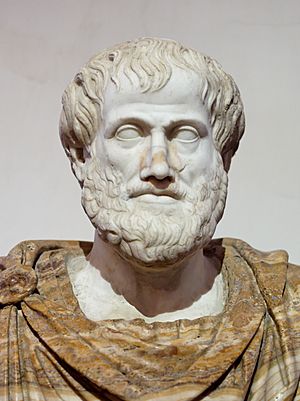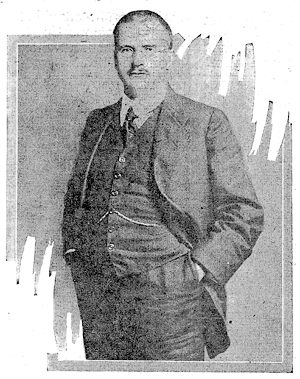Logos facts for kids
Logos (pronounced LOH-gos) is an important word from Ancient Greece. It means "word," "reason," or "plan." This term is used in many areas like Western philosophy, psychology, and rhetoric. It often refers to using logic and clear thinking to understand things.
The idea of logos helps us think about how we use words and arguments. It's about making sense of the world through reason.
Contents
What Does Logos Mean?
The word logos comes from an old Greek word, légō, meaning "I say." It's also connected to words meaning "to put in order," "to count," or "to speak."
Today, logos often means "reason," "account," or "discourse." In math, it can even mean "ratio."
In simple terms, logos is about using facts and logic. It's one of the main ways to convince someone, especially in arguments or speeches.
Where Did the Idea of Logos Come From?
Early Greek Thinkers
The philosopher Heraclitus (around 535–475 BC) was one of the first to use logos in a special way. For him, logos was a universal law or pattern that helped explain how the world worked. It was like a hidden truth that connected everything.
Heraclitus believed that even though this logos was always there, people often didn't understand it. He said:
This logos holds always but humans always prove unable to ever understand it... For though all things come to be in accordance with this logos, humans are like the inexperienced... But other people fail to notice what they do when awake, just as they forget what they do while asleep.
He also suggested that if we listen to this logos, we would see that "all things are one."
Aristotle and Persuasion
Later, Aristotle (384–322 BC) gave logos a specific meaning in rhetoric. Rhetoric is the art of speaking or writing to persuade people. Aristotle said there are three main ways to persuade an audience:
- Logos: This means using logic and reason. It's about the facts and arguments in your speech.
- Pathos: This is about appealing to emotions. It's when a speaker tries to make the audience feel a certain way.
- Ethos: This is about showing that the speaker is trustworthy and has good character.
Aristotle believed that logos was about "the speech itself, in so far as it proves or seems to prove." Using logic makes a speaker seem smart and prepared.
Stoic Philosophy
The Stoics, another group of ancient Greek philosophers (starting around 300 BC), saw logos as the active reason that runs the entire Universe. They thought of it as a divine force or Nature itself.
They also talked about the logos spermatikos, which means the "seed-like logos." This was the idea that the universe has a natural law or principle that helps everything grow and develop. Stoics believed that every person has a part of this divine logos within them.
Isocrates and Civic Discourse
Isocrates, another Greek teacher, focused on logos as speech, reason, and public discussion. He believed that using logos and philosophy could help citizens of Athens work together for the "common good."
Logos in Different Religions
Jewish Philosophy
Philo (around 20 BC–50 AD), a Jewish philosopher who lived in Greece, brought the idea of logos into Jewish philosophy. He saw logos as a divine being or power that helped God create the world. Philo called it "the first-born of God." He also believed that the logos held everything together in the universe.
Christianity
In Christianity, logos is a very important term, especially in the Gospel of John. It is used as a name or title for Jesus Christ. The first verse of the Gospel of John says:
In the beginning was the Word, and the Word was with God, and the Word was God.
Here, "the Word" is logos. Christians believe that Jesus is the incarnate Logos, meaning God's divine reason or word made into a human being.
Islam
The idea of logos also appears in Islam, especially in the writings of Sufi mystics and philosophers. They use terms like ʿaql ("Intellect") or al-insān al-kāmil ("Universal Man") to describe a similar concept.
In Sufism, logos helps connect God (the "Uncreated") with humanity (the "Created"). Sufis believe that without logos, there can be no connection between humans and God. Figures like Jesus and Muhammad are seen as examples of this logos.
The philosopher Ibn Arabi (1165–1240 AD) believed that every prophet was a "logos" (or Kalimah), an aspect of the unique divine being. He thought that the divine being would have stayed hidden if not for these prophets, with logos acting as the link between humans and God.
Logos in Psychology
The psychologist Carl Jung used logos in his analytical psychology. He saw logos as representing the masculine principle of rationality and logical thinking. He contrasted it with eros, which he saw as the feminine principle of emotion and connection.
For Jung, logos was about "objective interest" and conscious activity, while eros was about "psychic relatedness" and the unconscious. He often looked at these as "paired opposites," like the yin and yang in Eastern philosophy.
Logos and Rhetoric Today
In modern rhetoric, logos is still about using logical arguments. It means providing facts, figures, and clear reasons to support your point. When you use logos, you appeal to your audience's sense of logic.
You can do this in two main ways:
- Inductive reasoning: Giving specific examples and then using them to support a general statement.
- Deductive reasoning: Starting with general ideas and then showing how specific situations fit those ideas.
Images for kids
See also
 In Spanish: Logos para niños
In Spanish: Logos para niños
 | Roy Wilkins |
 | John Lewis |
 | Linda Carol Brown |








